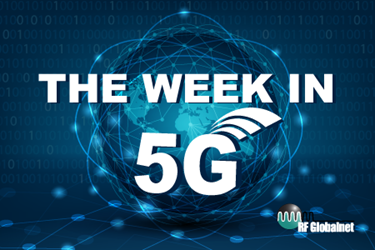The Week in 5G: 6/23/2020 — Nokia Tests in C-Band; Verizon Claims Successful DSS Tech Trials
By Ed Biller

In network rollout news, Telus will join Rogers Communications and Bell Canada among the Canadian telcos with active 5G networks after switching on its first few locations this week, reports BNN Bloomberg. The Telus 5G network will initially be available in Vancouver, Montreal, Calgary, Edmonton, and the Greater Toronto Area, though the telco plans to add 26 more markets before the year is out.
In Germany, Telekom Deutschland unveiled its new 5G network and claimed that 16 million people across more than 1,000 locations now can access the service, reports Light Reading. Deutsche Telekom expressed a desire to provide 5G to half the country’s population (~40 million people) by the end of July, the report states.
In technology news, Verizon (U.S.) announced this week it has completed successful dynamic spectrum sharing (DSS) technology trials in Texas and Minnesota. A Verizon press release states that the trials, “conducted in a live network environment, showed effective completion of data sessions with both LTE and 5G NR services running simultaneously over low band spectrum.”
Verizon added the DSS will be commercially deployed “in the near future.”
Samsung Electronics, meanwhile, has demonstrated a new drone-based antenna configuration measurement solution the company claims will allow engineers to inspect 5G base stations remotely. The solution allows engineers camera-equipped drones, controlled by a smartphone, to capture images of antennas on rooftops or base station towers, according to a statement from the company, which also released video demonstrating the technology.
Nokia dropped several big announcements this week. First, Capacity Media reports Nokia’s next-gen 5G AirScale Cloud RAN solution, based on vRAN2.0, will be commercially available this year, “with general availability expected in 2021.”
Nokia also announced completion last week of a successful series of Over-the-Air (OTA) 5G NR (new radio) trials in the C-band spectrum conducted in Dallas, Texas, using its commercial AirScale 5G base station equipment — which the company claims are the first such trials in the U.S.
In Japan, Toyota Production Engineering Corporation (TPEC) has tapped Nokia (working with local systems integrator NS Solutions) to deploy an industrial-grade private wireless network at its manufacturing design center in Fukuoka, Japan, according to a Nokia press release.
“Initially, a private LTE/4.9G network will be deployed at TPEC’s site supporting a range of IoT-based devices that enable equipment digitization and visualization. Over time, the network will be upgraded to 5G,” states the release.
In the U.S., the House of Representatives has introduced legislation that would direct the Department of Defense to “pursue calculated moves to refine and secure fifth-generation information and communications technology across its military enterprise,” reports Nextgov.
The DoD 5G Act outlines six DoD directives, including establishing a means to “clearly and authoritatively” communicate about foreign threats to the agency’s networks and unleashing “independent red-team security analysis” honing in on the department’s multitudes of systems, subsystems, devices and components, states the report.
Finally, a New York Times report from earlier this month lays bare how Russia is exploiting anti-fact, anti-5G Americans’ ignorance to gain a leg up over the U.S. in fifth-generation rollouts and technology. The propaganda arm spreading disinformation, RT, is the same U.S. intelligence agencies identified as a “principal meddler” in the 2016 U.S. presidential election, the report states.
